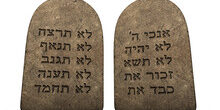Torah: Naso (Numbers 4:21-7:89) Haftarah: (Judges 13:2-25)
The Torah has many interesting mitzvot and these are a few; a census was taken in the Sinai desert, a total of 8,580 Levite men between the ages of 30 and 50 are counted in a tally of those who will be doing the actual work of transporting the Tabernacle. Then the enumeration of the Levite families and their duties, removal of unclean persons from the Israelite camps, law of jealousy, the Nazirite Code, the Priestly blessing, and the offerings of the Tribal chieftains.
This is the longest portion in the Torah. The first half deals with the community and the circumstances of the people and their behavior. The second half discusses the offerings brought to the sanctuary by each tribe. The census was taken for security going into the new land and for caring for the Tabernacle. While the Israelites journey continues there is a concept development between individuals. Ma’al: trespass which means; “When a man or woman shall commit any sin that men commit, to commit a trespass against Lord… and he shall make full restitution for his guilt in full” (Numbers 5:6-7). If an individual has committed a wrong action against another person, this individual has sinned against G-d. G-d requires from us that we deal justly and equally to everyone. When the person amends for their transgression against others, then they will receive forgiveness from G-d.
A notable blessing from the priests. The priest was delegated to offer G-d’s blessings. The priestly blessing you will probably know. There are three separate parts:
“ The Lord bless you and keep you; the Lord make His face to shine upon you and be gracious to you; the Lord lift up His countenance unto you and give you peace.” During this recitation the Kohanim (priests) have their tallitot over their head with their hands spread open to bless the congregation. Everyone lowers their head and does not look upon the Kohanim because G-d’s radiance shines upon all of us. Most know that this is done on Yom Kippur and other festivals.
While I am discussing services, I am delighted to announce that Beit Chaverim will have a Hazzanite (woman cantor). Most of you know her for her beautiful voice as she chants our Sabbath and High Holiday prayers. Ellen Margles will enhance our services, which will make our Sabbath and holidays very spiritually uplifting. I am always happy when members of our congregation volunteer their time because when one does this Tzedakah (righteous actions) it brings everyone closer to Torah and G-d.
The Jewish people do not usually use the word “charity” ; it is a Christian term.
The word Tzedakah, righteous actions, is used for charity or the Chesed/Grace.
Shabbat Shalom,
Rabbi Helene Ainbinder







